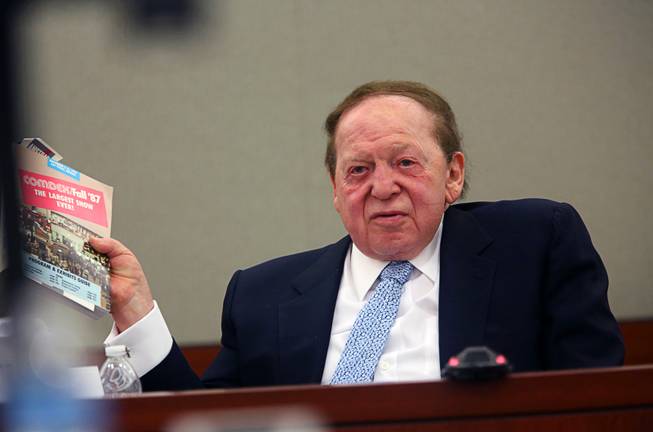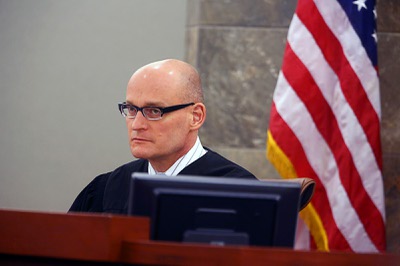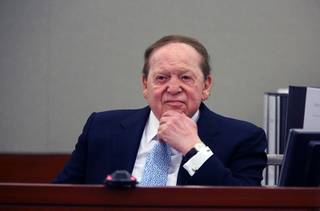
Jeff Scheid/Pool
Sands Chairman and CEO Sheldon Adelson testifies on the witness stand at the Regional Justice Center Thursday, April 4, 2013. Former consultant Richard Suen is suing the Las Vegas Sands saying he is owed millions of dollars in an agreement in which he helped Sands secure its gaming license in Macau a decade ago.
Friday, April 5, 2013 | 2 a.m.
When he wasn't quipping one-liners from the witness stand or arguing with lawyers, Sheldon Adelson had trouble remembering details of how he built a casino empire in Macau.
But one thing the billionaire seemed to know for certain: The man suing Adelson's company for $328 million didn't deserve it.
Making a rare public appearance, the chairman and CEO of the Las Vegas Sands Corp. testified on Thursday that he didn't need any help getting permission to open casinos in Macau. The company now now owns six of them along the glittering Cotai Strip, which Adelson has called "Las Vegas of the Far East."
Hong Kong businessman Richard Suen certainly wasn't any help, Adelson insisted from the witness stand — at least nothing approaching the millions being claimed in the contract dispute that's into its second trial at the Regional Justice Center in downtown Las Vegas.
Suen is suing the Sands, which owns the Venetian and Palazzo here, saying he was promised fees and a percentage of the profits for helping the company gain a foothold in Macau.
Adelson, 79, said his reputation in the convention business is what allowed him to begin building casinos in 2003 that now represent the lion's share of the Sands' record profits from megaresorts like the Venetian Macau, the Sands Macau and the Plaza Macau.
"That's what the Macau government wanted — people with convention experience," Adelson testified. "They wanted to change the face of Macau from the gambling dens to that of conventions and resorts.
"We took a swamp and a bay and transformed it into the Cotai Strip," Adelson added.
Suen insists Adelson needed help, because for 40 years Macau gambling operations were the monopoly of one man, Stanley Ho.
Adelson acknowledged that he enlisted Suen to help get a gaming license. Lenny Adelson had introduced his brother to Suen, who sold hotel supplies to the Venetian in Las Vegas, in 2000. But Sheldon Adelson said once Macau officials lifted the monopoly and opened the market to outside companies in October 2001, Sands no longer needed Suen.
"Once they announced that, his ability to get a license was cut off," Adelson testified Thursday. "He couldn't give anything to us that wasn't available to us."

Clark County District Judge Rob Bare presides over a trial at the Regional Justice Center Thursday, April 4, 2013. Former consultant Richard Suen is suing the Las Vegas Sands saying he is owed millions of dollars in an agreement in which he helped Sands secure its gaming license in Macau a decade ago.
Adelson appeared to change his story from what he'd said in earlier depositions in the case and he'd said in the first trial in 2008, when a jury awarded Suen $43.8 million. The Nevada Supreme Court eventually struck down that verdict, bringing the case back to trial.
Adelson also did not put any such deadlines in writing. Suen lawyer John O'Malley produced a letter written in December 2001, in which Adelson requested Suen's help, two months after Macau had said it would take bids from outside companies.
There were no deadlines in that letter.
"It was understood," Adelson told the jury.
Adelson nearly caused a mistrial on the first day of testimony, when he began pulling books and convention brochures about his company from the 1980s to show his prowess in the convention industry.
James Pisanelli, lead attorney for Suen, accused Adelson of trying to hijack the trial by introducing new evidence that had not been approved by the court.
"It was intentional and improper," Pisanelli argued.
The Sands legal team appeared just as surprised, saying they had told Adelson not to bring the books to court.
Clark County District Judge Rob Bare denied the request for a mistrial, but he told the jury to disregard the books and ordered Adelson not to pull anything else out of his little black bag.
Bare repeatedly reminded Adelson to answer questions posed by O'Malley, as the casino executive either chose to trade verbal spars with Suen's counsel or veered off into lengthy asides or drawing giggles with quick quips.
Asked to describe the height of Chinese officials at one meeting in Bejing, Adelson answered: "I've always been short."
Adelson, who slowly moved about the courtroom with a cane during breaks and used a motorized scooter in the courthouse hallways, did remember minute details of a phone conversation with former House Majority Leader Tom DeLay. Adelson recalled when the Texas congressman was throwing a barbecue.
"He was out getting sausage," Adelson said. Then he added: "I'm a hot dog freak."
The conversation with DeLay brought more arguments over hearsay evidence — a key component that led to the first trial being overturned.
Suen contends that he helped Adelson get pull from government officials in China, who influenced the deal that let Sands build in Macau.
One of those meetings with Suen, his lawyers say, involved China seeking Adelson's help with its Olympic bid. Adelson admitted he did call DeLay during the barbecue about a nonbinding resolution in Congress that asked the U.S. Olympic committee to vote against holding the Games in Beijing.
Bare had originally ruled the conversation was hearsay, and not allowable during the trial.
But Adelson, who spent some $98 million trying to influence the last U.S. presidential election, claimed he had no pull with governments.
"I think it's ridiculous — that a kid from the slums, me, could help China, the largest country in the world, get the Olympics," Adelson testified.
Bare, meanwhile, said that opened the door for O'Malley to use the conversation with DeLay to impeach Adelson's testimony.
Adelson continued to spar with O'Malley.
When asked if the Beijing mayor had asked for help with the Olympics, Adelson replied: "I don't know what he said. I couldn't understand him."
"Because he was speaking Chinese?" O'Malley asked.
"It all sounded Greek to me," Adelson answered.
Bottom line, Adelson said, is Sands never received a gaming license in Macau.
"I'm not trying to misrepresent or razzle-dazzle you," Adelson testified. "We don't have a license."
Technically, Sands entered Macau as a sub-concessioner with Galaxy Entertainment, which holds the gaming licenses.
Suen's lawyers contend his relationships with officials in China helped Adelson's company get that deal.
Adelson remains on the stand, as the trial continues Friday.


Join the Discussion:
Check this out for a full explanation of our conversion to the LiveFyre commenting system and instructions on how to sign up for an account.
Full comments policy